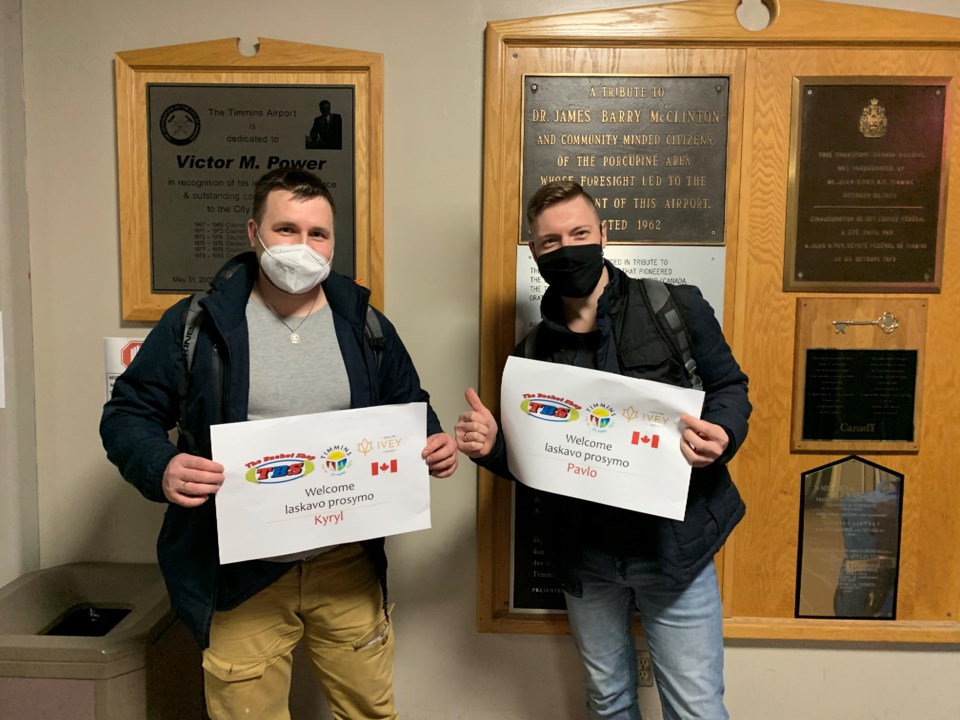The Bucket Shop (TBS) is addressing its need for qualified tradespeople by turning to international recruitment.
Before the pandemic started, the Timmins business embarked on a journey of hiring six qualified tradespeople from outside of Canada.
Eighteen months later, two of the workers arrived in Timmins from Ukraine.
Wednesday, April 28, was the first day at The Bucket Shop for welders Kyryl Ponomarenko and Pavlo Semernev.
They were hired by TBS with the help of the IVEY Group, an international recruitment and consulting firm.
As the company was expanding projects and was in “desperate need” of skilled tradespeople, it needed six workers to support its growth, said Jamieson Pouw, The Bucket Shop's business optimization lead. In addition to Ponomarenko and Semernev, the business is also hiring two welders from Ukraine and two more from Mexico.
Before looking for foreign workers, the company searched locally, Pouw said.
The Far North East Training Board’s October 2020 COVID-19 survey showed that welders are some of the hardest positions to fill in Timmins. Others include security, administrative staff and receptionists.
According to the survey, 74 per cent of respondents in Timmins said the occupations were hard to fill because of few suitable applicants, 43 per cent said applicants don’t have the technical skills required for the positions, while 38 per cent said applicants don’t have the work experience needed for the positions.
The need for qualified professionals in Northern Ontario can be explained by the decreasing labour force as young people are migrating to southern Ontario, Pouw said, noting how the economy is growing but the population is declining.
The Bucket Shop went through the Labour Market Impact Assessment (LMIA) to show the federal government it couldn’t find qualified people locally and needed to hire people from abroad.
Pouw explained the business took its time but the process could be fast-tracked to be done in as little as three months.
The Timmins Economic Development Corporation (TEDC) exposed the business to the immigration process and the existence of programs like the Rural and Northern Immigration Pilot (RNIP), Pouw said. The company then decided to hire IVEY Group to help screen and recruit qualified welders.
“If you need additional support for qualifying your candidates, that’s where the company like IVEY would play a role,” Pouw said.
There’s a large pool of qualified welders in Mexico, Chile, Cuba, Ukraine, Poland, Belgium and Russia, Pouw said. As the business is expanding, it has also sent an offer to an industrial painter from Mexico.
The immigration firm screened about 24 candidates that applied to be a welder in Northern Ontario, Pouw said. Out of nine people who were interviewed, six were chosen to come to Canada.
Prior to having video interviews, each of the nine candidates had to take written and verbal English tests, do a video interview introducing themselves and their qualifications, and submit another video showcasing their skills.
After that, video interviews were held between a candidate and representatives from IVEY and The Bucket Shop. For Pouw, there weren’t any issues interviewing candidates virtually.
After the two welders from Ukraine arrived, the challenge was setting them up to be residents with a bank account, a social insurance number, a cellphone or explaining how to contact a doctor if they need medical support, Pouw said adding how the pandemic restrictions presented additional challenges.
For employers looking to hire internationally, Pouw advises taking advantage of available resources and avenues and to be prepared to spend some time on the process.
“We’re on the track of growth. The immigration is now becoming a national strategy and all of the infrastructure and economic organizations will have to grow if we triple the size,” Pouw said, explaining there’s a national initiative advocating for policies that would allow the Canadian population to grow to 100 million by the end of the century.
“We’ll need to embrace immigration and welcome new people to Canada. Now is the time to get used to it because it will be a part of who we are as a country for the next 30 years,” he said.
The Bucket Shop is also addressing the need for qualified people by providing training to Indigenous women in partnership with Keepers of the Circle.
The hands-on program started in July 2019. The eight-week program trains four Indigenous women at a time, seven hours a day. At the end of the program, the women take a test to become certified welders.
“It’s a learning environment that simply can’t take place in college or high school. They’re immersed in the same projects that are happening in the mining sector,” Pouw said, adding the costs of the program are covered and the women are paid and treated as employees.
The Keepers of the Circle interview the candidates before they join the training at The Bucket Shop.
In the first year, there were 16 graduates. The second year, which ends in September, will have 24 graduates. So far, 100 per cent of the woman who went through the program received their welding certification, according to Pouw.
“Sometimes, they stay with us. Sometimes, they go back to their First Nation’s territories and become their own welders. And even better, they can be employed by the mines,” he said.
In the fall, there are plans to double the number of trainees to eight women at a time. If it goes well, The Bucket Shop plans to start working with the government for funding to create a building dedicated to training for the mining sector, according to Pouw.
– TimminsToday




.jpeg;w=120;h=80;mode=crop)